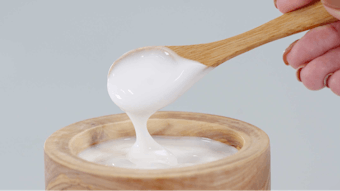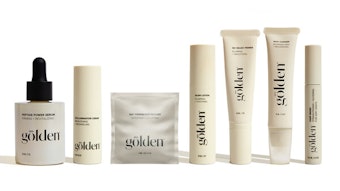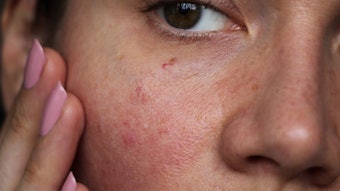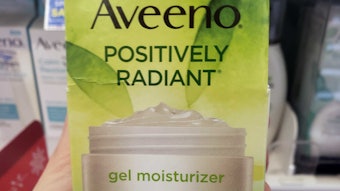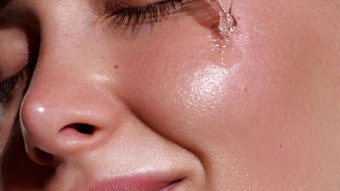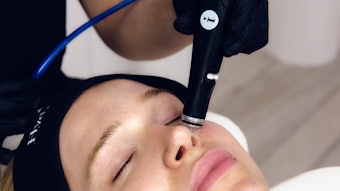New ingredients and cutting edge technologies are always available, so in today's professional skin care market, more then ever, it is essential that the professional skin care therapist stay abreast of all the new emerging ingredients. It's not just important to know what to use, but also how to combine different products for maximum efficacy.
C&T: What does the phrase “professional product” mean to you?
CHERIE: Something that is not sold through the mass market (the department stores, drug stores). It should be offered through higher-end medi-spas, physicians, estheticians, that have gone to school and been taught the understanding and the makeup of the product line.
C&T: Is a degree or certification necessary to be selling professional products?
CHERIE: No, but I think it is to their advantage that they educate themselves on the latest technique and how the process of each ingredients actually works on the skin. It’s usually up to the skin care company or the esthetician researching a particular ingredient, because there’s so much information out there that is readily available for the consumer. People in the industry have to stay on top of everything that “they” are trying to accomplish. So many people out there are addicted to the internet. Even magazines are selling their product differently than the way they used to. Years ago we didn’t have the knowledge that we have now on ingredients, and we can prove now that they’re transdermal. So I’m seeing a huge transition in the market as to how we sell products. You still have that beautiful face, but now there’s a little bit of science behind it. Customers usually bring in that article or the name of the product to the esthetician, so it is to the advantage of the esthetician to be up on everything so they are successful and believable. That’s another reason why we have to stay on the cutting edge, compared to department store sales employees whose biggest concern is about their commission. What it comes down to is making sure we sell effective products to the right person.
C&T: A Kline and Company market report says spa people need training from the marketers. But there’s also the Internet.
CHERIE: The Internet is a good starting place. If you really want to research a particular product line it’s best to get that training from the particular company because the company can explain why the ingredients are in there and why they’re blended with other ingredients and how to use the product and actually put a protocol together. But for questions about specifics (molecular weight of a material, its pH, its skin penetration, etc), you can do that on the internet. Usually the companies, myself and my competitors try to provide as much information as possible so that spa people have the confidence of the clients; and it helps the spa people, themselves. The more they know, the better it will be for them. I work with a lot of esthetic schools all over the US. Whether I’m talking to them about my skin care line or someone else’s, I always say to them, “Understand the ingredients and you’ll be able to sell any product for any skin type.”
C&T: Is there a way to bridge the gap between spas and formulators?
CHERIE: I learned from estheticians, from physicians, from being a consumer. I receive raw materials from companies all over the world. It’s my job to research through all of their information to find out how effective this particular ingredient is and how it works and why it works and timing, etc. I learn a lot in the industry, especially with all the new and upcoming procedures from some of the companies that own lasers and different equipment. That’s something that we are constantly staying on top of. If there’s a particular procedure that has just come out we want to make sure that if there’s a product or particular ingredient that’s going to be especially effective with that new procedure, we have to know about it.
C&T: When you presented at the Society of Dermatology SkinCare Specialists (SDSS) in February, did a particular line of questioning develop from your audience?
CHERIE: At that meeting in Washington, the biggest question we were getting asked was about our ingredients. That’s something I’m pretty particular about – minimizing the preservatives, trying to avoid unnecessary fillers that can irritate the skin. I’m not saying we need to eliminate it all together. Certain products will still need those higher concentrations or special preservatives to help keep the product stable. But what we see in our industry are people with various skin concerns. The average consumer that has great all-around normal beautiful skin probably can tolerate a lot of different products out there. But for those people that we see – people with severe acne, rosacea patients – they have a harder time with those ingredients. Their skin almost resists. It’s up to us to kind of use other ingredients to build that skin immunity back up. So I try to eliminate a lot of the possible irritants because even though there might be an active ingredient that’s supposed to address that skin concern, all the surrounding ingredients may cause irritation down the road. That’s another thing I’m always learning and teaching the estheticians.
C&T: What would you want to say about peptides?
CHERIE: Whether you’re 20 or 60, I would recommend peptides. I haven’t found anybody or any type of skin that would have contraindications to using the peptide. They’re amazing. I’m seeing more and more uses every day. I think peptides are going to be the new wave of the industry. We can take very active, viable ingredients like that peptide to whatever we’re trying to accomplish and get some phenomenal results with several different types of skin. Even the colors of skin we can seriously address as well.
C&T: How does pep talk fit into training?
CHERIE: I try to give as much information about peptides and describe how the peptides work; they work in different ways; I talk about the peptides that I use. I found some cases where a person is very sensitive to retinol will do very well with peptides because they help address the same concerns that we would normally address with a vitamin A product. I just explain to the consumer or the professional all the advantages of the peptide: how they help to hydrate the skin at the same time they are helping balance out the sebum and minimizing acne. We find that a successful esthetician is going to be innovative, to the point where they are going to want to push that border to see how far they can really go with that skin; they have good results; that’s how another new idea develops.
For more information, e-mail [email protected] and [email protected] or visit www.dermastart.com.

